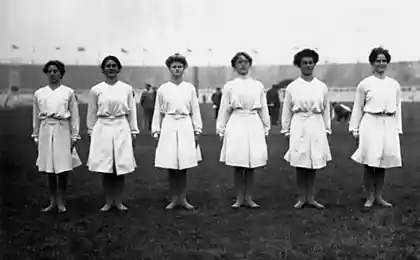1387
10 interesting facts about the ancient Olympic Games
1. Ancient Greek athletes competed naked
Yes exactly. Ancient Greek athletes ran, fought and competed naked. That is from the word "naked» («gymos») comes the word "gymnastics". At competitions, athletes smeared his body with olive oil, which further emphasizes the beauty of the naked body. It was not considered something shameful. Naked, beautiful body showed how upopno trained athletes. Incidentally, they are also trained naked. And symposiums were bare. In fact, boring word symposium comes from the Greek «sympotein», which means "to drink together." Ancient Greek symposia were nothing more than, and feasts, where it was full of courtesans.
In the sixth century there was an attempt to "dress" the athletes, but this innovation did not become popular. Nudity soon acquired the status of fashion in athletics.
2. prude were kinodesmy
Some athletes follow the etiquette and wore kinodesmy - thin leather thong (kynodesme) tied to the foreskin of the penis and tied at the base of the penis or with tension up fasten around the waist. Wearing kinodesmy considered a sign of modesty and decency, because let expose the glans.
3. The first Olympic Games won chef
The first Olympic Games were held in 776 BC The first champion was the baker Koreb of Alice. He was the best runner in the 190 meters. This race was the only Olympic competition the first 13 games.
4. Prize - an olive branch
The ancient Greeks had no medals, as at present. The winners of the games were awarded an olive branch olive wreaths and amphorae of consecrated olive oil. Later, the winners were awarded laurel wreaths and apples. All this was a great honor. Winners were welcomed as national heroes and showered with gifts. Many famous athletes received money for posing painters and sculptors.
5. Running, wrestling, boxing ...
At the very beginning of the game consisted of only one run on stages (equivalent to running 190 meters). In 724 BC. e. to add to it a double jogging - diaul - at a distance of 384, 54 meters. Then, in 720 BC. e. long run - dolihodrom - or running on stage 24. In 708 BC. e. at the 18th Olympic Games, there was a pentathlon, consisting of simple running, long jump, discus and javelin. At the same Olympics were first held wrestling. The judge could beat an athlete stick for breaking the rules. Some historians believe that boxing was born in Sparta. The Spartans did not consider it necessary to gear helmets in battle. Melee combat, they are prepared for this fight. Another five Olympics, in 688 BCE. e., the program has been enriched fist fight, two Olympics - chariot races.
6. Pankration
Do you think the struggle - cruel competition? Then you do not know what the pankration. At the 33rd Olympiad in 648 BC. e., there is the most difficult and certainly the most brutal form of competition - pankration which combines techniques of boxing and fighting.
It was forbidden only scratch out his eyes and biting. Violators of the rules the referee batted. Everything else was allowed. Any stroke, seizure, kicking legs, painful receptions - it was against the rules. Even allowed to stifle the opponent to break his fingers, and so on. D. There was not even any division into weight categories and time constraints. The fight ended when the enemy surrendered, lost consciousness and died.
In 564 BC, Arihion of Phigalia was declared the winner of the pankration ... after his death.
"Gippostrat already grabbed one arm Arihiona waist, pressed down, while the other hand began to choke. Arihion began to lose consciousness, but was still alive. So when Gippostrat ceased to apply pressure on his legs, Arihion gathered all his strength and managed to knock the opponent. The blow was so strong that Gippostrat broke his ankle and gave a hand signal, he resigns. Thus, Arihion at the time of his death became the Olympic champion, it was his third and final victory. Crown winner put on the lifeless body Arihiona ».
7. Olympic Games - not only entertainment Greeks
The Greeks were very fond of sports. And the Olympics were the only one of the four obscheellinskih agony, called Panhellenic games.
The original Panhellenic Games consisted of the following stages:
Olympic Games - the most important event, held once every four years at Olympia in honor of Zeus. The winners were given wreaths of olive branches.
Pythian Games - held every four years at Delphi in honor of Apollo. The winner receives a laurel wreath.
Isthmian Games - held every two years near Corinth in honor of Poseidon. The winner receives a wreath of elder and later Fir.
Nemean Games- held every two years, near Nemea in honor of Zeus. The wreath of the winner was made of celery.
The winner in each sport in all four games, received the honorary title periodonika. Later, in the Hellenistic panelliniskimi games were called and local contests.
8. Hera or games for women
The announcement of the Olympics led to an unprecedented revival among all Greeks. People packed into the boat, gathered in huge crowds and walked everywhere you could see rows of men and boys heading to Olympia. The exceptions were the married women, which was forbidden under pain of death to attend the games. In his book "Description of Greece" Pausanias writes that near the Olympia, on the banks of Alpheus, towered a huge rock, which had lead women trying to enter the sacred Games and drop them there.
But this does not mean that women have always been on the sidelines. They had their games, which were held in the town of Gera in honor of the goddess Hera. Women competed in the race, but the treadmill is 1/6 less than men in view of the fact that the female step 1/6 less masculine. Winners in women receiving not only the olive wreath, but also meat.
In general, girls are trained from childhood, did not teach any struggle. But they were trained in Sparta as well as boys. The girls were to become a true warrior. By the way, they also competed completely naked. In addition, men even allowed to watch the competition to choose his future wife.
9. Ancient "computer" appointed date of the Games
In 1901, near the island Antikifera aboard the sunken ancient Greek ship was found an unusual device, called the Antikythera Mechanism. Scientists believe that this device was created between 150 and 100 years BC. Because of the complicated structure of its research is still going on. A recent study device using X-rays allowed to determine the appointment of Antikythera mechanism and discover some amazing features. It was found that the Antikythera Mechanism - a mechanical calculator, and it seems impossible for the accuracy of the time of its creation. It was assumed that mankind could create such a complex device only a thousand years later. Its wheels and gears create a portable planetarium that can predict the position of the stars and planets, as well as lunar and solar eclipses. To investigate the mechanisms and the inscription on it, the researchers came to the conclusion that it was used to calculate the date of the Olympic Games.
10. Christian killed
Games
The Romans captured Greece, considered the Olympics pagan festival. Therefore, in 394 AD. AD the Roman Emperor Theodosius I issued a decree prohibiting the continuation of the Olympic Games. The emperor embraced Christianity and decided to eradicate anti-Christian games glorifying pagan gods. But in 1896 they revived, after 1500 years ...
Yes exactly. Ancient Greek athletes ran, fought and competed naked. That is from the word "naked» («gymos») comes the word "gymnastics". At competitions, athletes smeared his body with olive oil, which further emphasizes the beauty of the naked body. It was not considered something shameful. Naked, beautiful body showed how upopno trained athletes. Incidentally, they are also trained naked. And symposiums were bare. In fact, boring word symposium comes from the Greek «sympotein», which means "to drink together." Ancient Greek symposia were nothing more than, and feasts, where it was full of courtesans.
In the sixth century there was an attempt to "dress" the athletes, but this innovation did not become popular. Nudity soon acquired the status of fashion in athletics.
2. prude were kinodesmy
Some athletes follow the etiquette and wore kinodesmy - thin leather thong (kynodesme) tied to the foreskin of the penis and tied at the base of the penis or with tension up fasten around the waist. Wearing kinodesmy considered a sign of modesty and decency, because let expose the glans.
3. The first Olympic Games won chef
The first Olympic Games were held in 776 BC The first champion was the baker Koreb of Alice. He was the best runner in the 190 meters. This race was the only Olympic competition the first 13 games.
4. Prize - an olive branch
The ancient Greeks had no medals, as at present. The winners of the games were awarded an olive branch olive wreaths and amphorae of consecrated olive oil. Later, the winners were awarded laurel wreaths and apples. All this was a great honor. Winners were welcomed as national heroes and showered with gifts. Many famous athletes received money for posing painters and sculptors.
5. Running, wrestling, boxing ...
At the very beginning of the game consisted of only one run on stages (equivalent to running 190 meters). In 724 BC. e. to add to it a double jogging - diaul - at a distance of 384, 54 meters. Then, in 720 BC. e. long run - dolihodrom - or running on stage 24. In 708 BC. e. at the 18th Olympic Games, there was a pentathlon, consisting of simple running, long jump, discus and javelin. At the same Olympics were first held wrestling. The judge could beat an athlete stick for breaking the rules. Some historians believe that boxing was born in Sparta. The Spartans did not consider it necessary to gear helmets in battle. Melee combat, they are prepared for this fight. Another five Olympics, in 688 BCE. e., the program has been enriched fist fight, two Olympics - chariot races.
6. Pankration
Do you think the struggle - cruel competition? Then you do not know what the pankration. At the 33rd Olympiad in 648 BC. e., there is the most difficult and certainly the most brutal form of competition - pankration which combines techniques of boxing and fighting.
It was forbidden only scratch out his eyes and biting. Violators of the rules the referee batted. Everything else was allowed. Any stroke, seizure, kicking legs, painful receptions - it was against the rules. Even allowed to stifle the opponent to break his fingers, and so on. D. There was not even any division into weight categories and time constraints. The fight ended when the enemy surrendered, lost consciousness and died.
In 564 BC, Arihion of Phigalia was declared the winner of the pankration ... after his death.
"Gippostrat already grabbed one arm Arihiona waist, pressed down, while the other hand began to choke. Arihion began to lose consciousness, but was still alive. So when Gippostrat ceased to apply pressure on his legs, Arihion gathered all his strength and managed to knock the opponent. The blow was so strong that Gippostrat broke his ankle and gave a hand signal, he resigns. Thus, Arihion at the time of his death became the Olympic champion, it was his third and final victory. Crown winner put on the lifeless body Arihiona ».
7. Olympic Games - not only entertainment Greeks
The Greeks were very fond of sports. And the Olympics were the only one of the four obscheellinskih agony, called Panhellenic games.
The original Panhellenic Games consisted of the following stages:
Olympic Games - the most important event, held once every four years at Olympia in honor of Zeus. The winners were given wreaths of olive branches.
Pythian Games - held every four years at Delphi in honor of Apollo. The winner receives a laurel wreath.
Isthmian Games - held every two years near Corinth in honor of Poseidon. The winner receives a wreath of elder and later Fir.
Nemean Games- held every two years, near Nemea in honor of Zeus. The wreath of the winner was made of celery.
The winner in each sport in all four games, received the honorary title periodonika. Later, in the Hellenistic panelliniskimi games were called and local contests.
8. Hera or games for women
The announcement of the Olympics led to an unprecedented revival among all Greeks. People packed into the boat, gathered in huge crowds and walked everywhere you could see rows of men and boys heading to Olympia. The exceptions were the married women, which was forbidden under pain of death to attend the games. In his book "Description of Greece" Pausanias writes that near the Olympia, on the banks of Alpheus, towered a huge rock, which had lead women trying to enter the sacred Games and drop them there.
But this does not mean that women have always been on the sidelines. They had their games, which were held in the town of Gera in honor of the goddess Hera. Women competed in the race, but the treadmill is 1/6 less than men in view of the fact that the female step 1/6 less masculine. Winners in women receiving not only the olive wreath, but also meat.
In general, girls are trained from childhood, did not teach any struggle. But they were trained in Sparta as well as boys. The girls were to become a true warrior. By the way, they also competed completely naked. In addition, men even allowed to watch the competition to choose his future wife.
9. Ancient "computer" appointed date of the Games
In 1901, near the island Antikifera aboard the sunken ancient Greek ship was found an unusual device, called the Antikythera Mechanism. Scientists believe that this device was created between 150 and 100 years BC. Because of the complicated structure of its research is still going on. A recent study device using X-rays allowed to determine the appointment of Antikythera mechanism and discover some amazing features. It was found that the Antikythera Mechanism - a mechanical calculator, and it seems impossible for the accuracy of the time of its creation. It was assumed that mankind could create such a complex device only a thousand years later. Its wheels and gears create a portable planetarium that can predict the position of the stars and planets, as well as lunar and solar eclipses. To investigate the mechanisms and the inscription on it, the researchers came to the conclusion that it was used to calculate the date of the Olympic Games.
10. Christian killed
Games
The Romans captured Greece, considered the Olympics pagan festival. Therefore, in 394 AD. AD the Roman Emperor Theodosius I issued a decree prohibiting the continuation of the Olympic Games. The emperor embraced Christianity and decided to eradicate anti-Christian games glorifying pagan gods. But in 1896 they revived, after 1500 years ...























